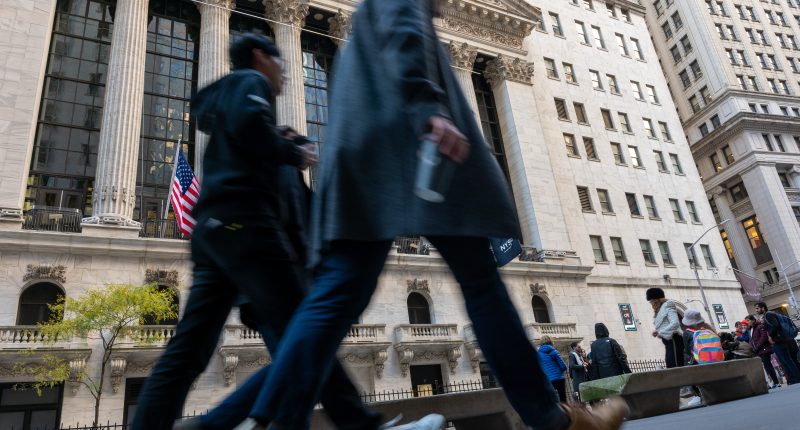THE UK economy flatlined between July and September, according to new statistics, adding to fears recession could be looming.
Data from the Office for National Statistics (ONS) reveals Gross Domestic Product (GDP) showed no growth across the three months.
A healthy economy is one where GDP is growing but if it stalls or is falling, it’s bad news for businesses and consumers.
If GDP drops for two consecutive quarters it is defined as a recession, which leads to job losses and wages stalling.
The latest figures from the ONS come after GDP increased by 0.2% between April and May.
Experts said the recent figures could be partly blamed on wet weather and industrial action in the summer.
Read more in Money
Flatlining GDP could also be down to soaring borrowing costs and stubbornly high inflation, which sat at 6.7% in September, they said.
GDP increased by 0.2% in September following growth of 0.1% in August.
However, across the three months it remained flat, with a 0.1% fall in the services sector offset by a 0.1% increase in the construction sector.
Across the same time frame there was flat output in the production sector.
Most read in Money
Darren Morgan, director of economic statistics at the ONS, said: “The economy is estimated to have shown no growth in the third quarter.
“Services dropped a little with falls in health, management consultancy and commercial property rentals.
“These were partially offset by growth in engineering, car sales and machinery leasing.
“There were also small growths in manufacturing, led by cars and metal products, while construction grew due to new commercial property work.
“In the month of September the economy grew slightly, with increases in film production, health and education.
“This growth was partially offset by falls in retail and computer programming.”
Alice Haines, personal finance analyst at Bestinvest, said the “dismal” latest quarterly figures could reignite fears the UK economy is heading for recession.
This would have “devastating consequences for people’s finances”, she added.
It comes after the Bank of England (BoE) also warned of a recession risk in the run-up to the general election next year.
Meanwhile, the British Retail Consortium and Barclays said retail sales were down in October, signalling households are cutting spending ahead of Christmas.
And this week, some analysts said we could already be in a recession as households squeezed their budgets.
The BoE recently signalled it intends to keep its base rate, a measure used to control inflation, high for an extended period.
It most recently held the rate at 5.25% after consecutive rises.
Emma-Lou Montgomery, associate director for personal investing at fidelity international, predicted it might not be until next August when the base rate would start to come down.
She added: “That means we’re still in uncertain territory for some time yet and that won’t be good news for retailers who badly needed the forthcoming festive spending season to be one that boosted the coffers.”
What does it mean for your finances?
Today’s figures mean the economy isn’t growing or shrinking, but after growth in the previous quarter, it could mean recession is coming.
In a recession job losses are common, as companies try to cut their costs to stay afloat.
Businesses may also go into administration or go bust.
The 2008 recession, for example, saw the loss of high street stores including music retailer Zavvi, clothes shop Principles, and stalwart Woolworths.
The Government may make cut backs or raise taxes to try and shore up its finances – alternatively, it may decide to increase budgets to spend its way out of the problem.
And the number of people in debt and arrears is also likely to soar, and there could be more defaults on loans and mortgages or repossessions and bankruptcies.
Read More on The Sun
Alice Haines said: “said: “A recession can have devastating consequences for people’s finances as a weaker economy can cause earnings to stagnate or drop and redundancies to rise as companies batten down the hatches and focus on reducing costs.
“Such a scenario, set against a backdrop of worryingly high borrowing and living costs, which eat into disposable incomes and leave little spare for life’s little luxuries, spells disaster for household finances already under severe strain.”
You can also join our new Sun Money Facebook group to share stories and tips and engage with the consumer team and other group members.










